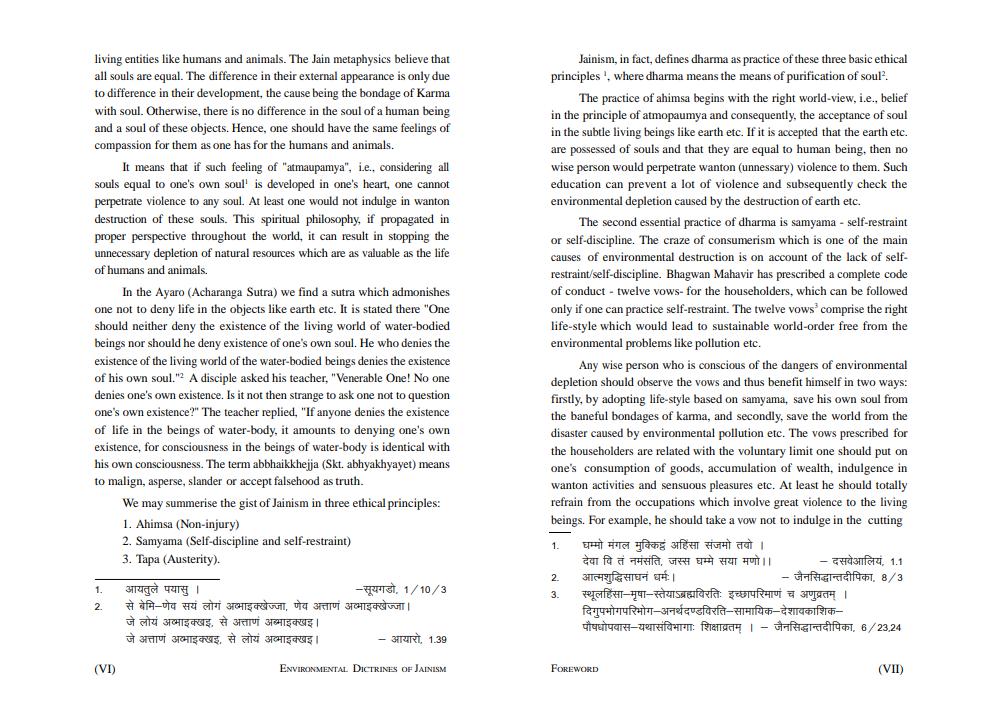________________
living entities like humans and animals. The Jain metaphysics believe that all souls are equal. The difference in their external appearance is only due to difference in their development, the cause being the bondage of Karma with soul. Otherwise, there is no difference in the soul of a human being and a soul of these objects. Hence, one should have the same feelings of compassion for them as one has for the humans and animals.
It means that if such feeling of "atmaupamya", i.e., considering all souls equal to one's own soul is developed in one's heart, one cannot perpetrate violence to any soul. At least one would not indulge in wanton destruction of these souls. This spiritual philosophy, if propagated in proper perspective throughout the world, it can result in stopping the unnecessary depletion of natural resources which are as valuable as the life of humans and animals.
In the Ayaro (Acharanga Sutra) we find a sutra which admonishes one not to deny life in the objects like earth etc. It is stated there "One should neither deny the existence of the living world of water-bodied beings nor should he deny existence of one's own soul. He who denies the existence of the living world of the water-bodied beings denies the existence of his own soul." A disciple asked his teacher, "Venerable One! No one denies one's own existence. Is it not then strange to ask one not to question one's own existence?" The teacher replied, "If anyone denies the existence of life in the beings of water-body, it amounts to denying one's own existence, for consciousness in the beings of water-body is identical with his own consciousness. The term abbhaikkhejja (Skt. abhyakhyayet) means to malign, asperse, slander or accept falsehood as truth.
We may summerise the gist of Jainism in three ethical principles: 1. Ahimsa (Non-injury) 2. Samyama (Self-discipline and self-restraint) 3. Tapa (Austerity).
Jainism, in fact, defines dharma as practice of these three basic ethical principles, where dharma means the means of purification of soul.
The practice of ahimsa begins with the right world-view, i.e., belief in the principle of atmopaumya and consequently, the acceptance of soul in the subtle living beings like earth etc. If it is accepted that the earth etc. are possessed of souls and that they are equal to human being, then no wise person would perpetrate wanton (unnessary) violence to them. Such education can prevent a lot of violence and subsequently check the environmental depletion caused by the destruction of earth etc.
The second essential practice of dharma is samyama - self-restraint or self-discipline. The craze of consumerism which is one of the main causes of environmental destruction is on account of the lack of selfrestraint/self-discipline. Bhagwan Mahavir has prescribed a complete code of conduct - twelve vows-for the householders, which can be followed only if one can practice self-restraint. The twelve vows comprise the right life-style which would lead to sustainable world-order free from the environmental problems like pollution etc.
Any wise person who is conscious of the dangers of environmental depletion should observe the vows and thus benefit himself in two ways: firstly, by adopting life-style based on samyama, save his own soul from the baneful bondages of karma, and secondly, save the world from the disaster caused by environmental pollution etc. The vows prescribed for the householders are related with the voluntary limit one should put on one's consumption of goods, accumulation of wealth, indulgence in wanton activities and sensuous pleasures etc. At least he should totally refrain from the occupations which involve great violence to the living beings. For example, he should take a vow not to indulge in the cutting
घम्मो मंगल मुक्किहूं अहिंसा संजमो तयो । देवा वि तं नमसंति, जस्स घम्मे सया मणो।। - दसवेआलियं, 1.1 आत्मशुद्धिसाधनं धर्मः।
- GARAG1961. 8/3 स्थूलहिंसा-मृषा-स्तेयाऽब्रह्मविरतिः इच्छापरिमाणं च अणुव्रतम् । दिगुपभोगपरिभोग-अनर्थदण्डविरति-सामायिक-देशावकाशिक
tari-periferit: f12116611 - H K C , 6/23,24
2.
आयतुले पयासु ।
- C, 1/10/3 से बेमि-णेय सयं लोग अभाइक्खेज्जा, णेय अत्ताणं अभाइक्खेज्जा। जे लोयं अमाइक्खइ, से अत्ताणं अमाइक्खइ। जे अत्ताण अमाइक्खाइ, से लोयं अमाइक्खाइ।
- START. 1.39
(VI)
ENVIRONMENTAL. DICTRINES OF JAINISM
FOREWORD
(VII)




